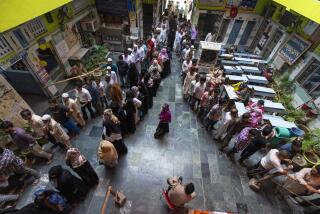Corruption Charges Fly as India’s Parliament Opens
- Share via
NEW DELHI — Facing multimillion-dollar kickback scandals and deteriorating relations with neighbor nations, the government of Prime Minister Rajiv Gandhi on Tuesday opened what opposition leaders have vowed will be the last parliamentary session led by the Gandhi family and its political party.
The session, known officially as the “monsoon session” because it coincides with the violent rains and torrential storms that lash the subcontinent in summer, could not have been more aptly named.
It began with screaming matches and loud condemnations of Gandhi, who faces an uphill battle to stay on in elections that must take place before the end of the year.
Charges of Corruption
At the heart of the criticism was the issue of corruption. According to many analysts, official corruption is more widespread today than at any time in India’s 42 years of independence.
There were new disclosures of impropriety involving the greatest scandal of Gandhi’s five years in office--the report of an independent audit commission investigating a $1.2-billion arms deal in which Gandhi is alleged to have received kickbacks.
The report, by the Indian comptroller and auditor general, confirmed that tens of millions of dollars in commissions were paid to middlemen under a 1986 contract to purchase 410 howitzers for the Indian army from the Swedish firm Bofors.
Swedish state radio has quoted senior Bofors sources as saying that the firm paid millions of dollars in bribes to Indian politicians and defense officials.
V. P. Singh, Gandhi’s former finance minister and now his principal political foe as head of a coalition of Indian opposition parties, has given reporters the numbers of Swiss bank accounts in which some of the commissions are said to have been deposited. Singh alleged that Gandhi was the beneficiary of the accounts.
Although Tuesday’s audit report stopped short of saying who actually received the commissions, it criticized the government for entering into the Bofors deal. The howitzers failed to pass field tests, the report said, and India has yet to receive enough of the artillery pieces to equip a single armored regiment.
The commissions were paid despite a standing government order not to use middlemen in arms purchases. And the terms of the Bofors deal, the report said, were inferior to at least two other proposals favored by the Indian army high command.
Other Scandals
There are other scandals buffeting Gandhi’s government, allegations of kickbacks and official improprieties ranging from the acquisition of fodder machines from an American businessman to deliberate government price fixing in the newsprint industry as a way of gagging the largely anti-Gandhi press.
Regional tension and terrorism also came up again at Tuesday’s session, and again the opposition placed the blame on the prime minister.
Opposition leaders said the Gandhi government is directly responsible for the continuing violence in India’s strategic northern state of Punjab, which borders on Pakistan, a traditional enemy of India. In Punjab, a group of radical Sikh secessionists are waging a campaign of terrorism that has left more than 2,000 dead in the past year.
Gandhi is widely credited with carrying out military operations that have isolated Punjab’s extremists from the mainstream Sikh community, but the opposition blasted the government for failing to follow up with a political solution.
“This government, which has lost the faith of the people of the Punjab and the faith of all the people of this country, has been unable to find a political solution to this problem, and for that alone a new government should come in this country,” one opposition leader declared.
Additional criticism was heaped on the government for its handling of the situation in war-torn Sri Lanka, India’s island neighbor to the south. A six-year-old insurgency by the ethnic Tamil minority has spawned a counterinsurgency by the majority Sinhalese. The conflict has left more than 9,000 dead. Two years ago, it led to a bilateral agreement to send Indian troops into the north of the island as a peacekeeping force.
Sri Lankan President Ranasinghe Premadasa demanded last month that the remaining 50,000 Indian soldiers be withdrawn before July 29. Gandhi has refused, and the deadlock has led analysts here and in Sri Lanka to speculate that war could break out soon between the two nations.
Takes Offensive
Gandhi and his party leaders have attempted to take the offensive politically, and in keeping with the Congress-I party’s traditional strategy, they charge that their opponents are anti-nationalist.
The party’s general secretary repeated the charge in Tuesday’s debate on the Punjab issue. He said it is the opposition that is playing politics with the crisis and that its criticism threatens India’s territorial integrity.
“The problem with the Punjab is linked with the unity and integrity of the country,” he said. “It is not linked to politics. There can be nothing more shameful for (the opposition) than to put Punjab into the garden of politics.”
An opposition leader confided after Tuesday’s session that the verbal battle is likely to continue throughout the monthlong session.
The newspaper Hindu summed up the political mood for the coming month in an editorial under the headline “War of Words.”
“The litany of innuendoes and abuses lately being spewed out by leaders of the opposition and the ruling party has topped even the high-decibel levels not uncommon in a contentious election year,” it said. “And in the no-holds-barred offensive mounted by each side on the other, truth, of course, is the first casualty.”
More to Read
Sign up for Essential California
The most important California stories and recommendations in your inbox every morning.
You may occasionally receive promotional content from the Los Angeles Times.













